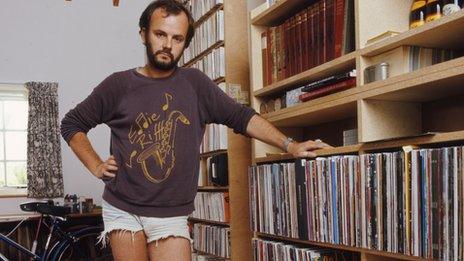Artists open up John Peel's historic vinyl collection
- Published
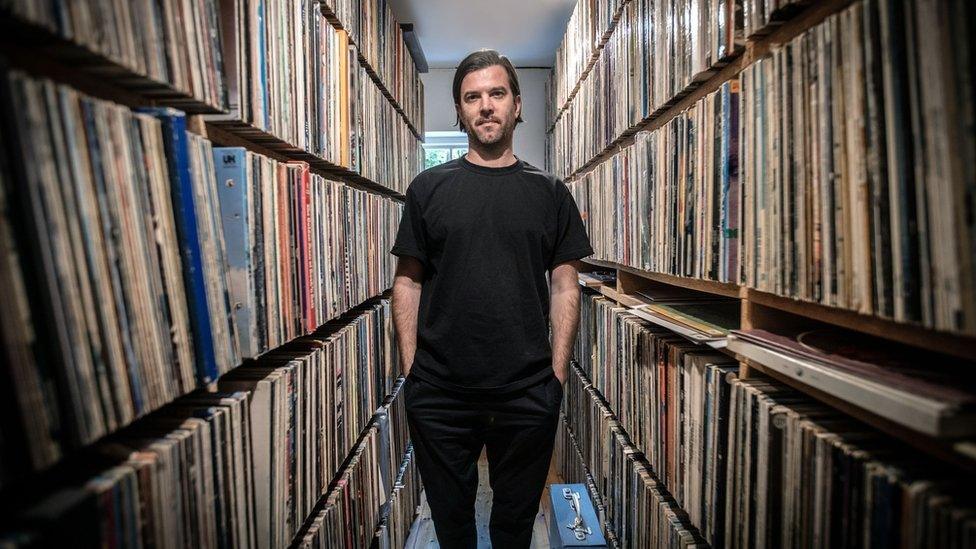
Tom Ravenscroft in the album section of his dad's collection
After John Peel's death in 2004, his family organised for an expert to catalogue the DJ's sprawling record collection.
Following a week of trawling through more than 120,000 albums, 12 inches and seven inches, at the Suffolk home affectionately dubbed "Peel Acres", the job was done.
Peel's son, BBC Radio 6 Music DJ Tom Ravenscroft, remembers the exhausted expert sitting in the family kitchen and offering a verdict: "You do realise this is the best record collection in the world?"
It's hard to argue.
While some collections may be bigger, or contain older records, John Peel's massive archive of vinyl comprises decades of UK music sent directly to him at the point of release by artists who viewed him as a unique tastemaker.
Before streaming - from pirate radio to Radio 1, bands knew if they wanted it heard, a play on the air from Peel was a must.
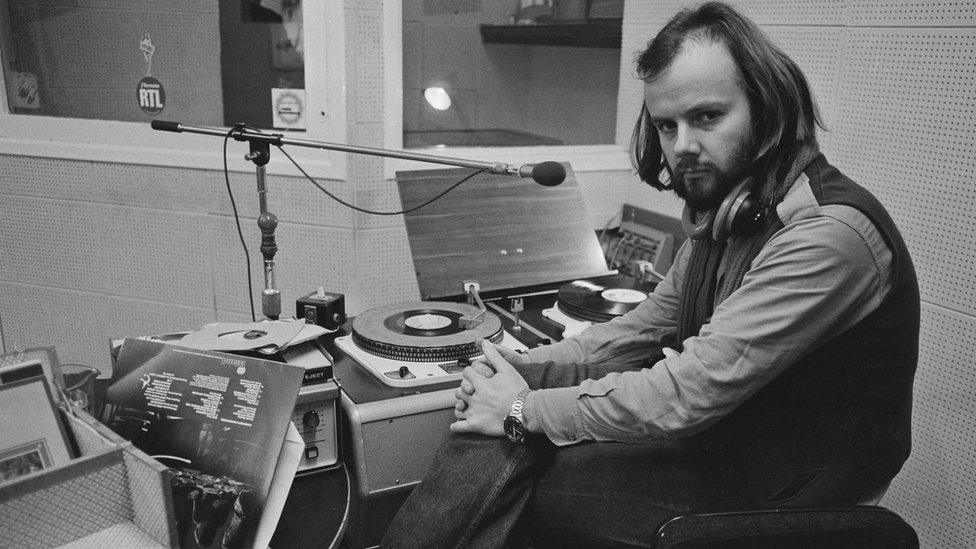
John Peel pictured presenting his Radio 1 show in 1972
The album sleeves bulge with personal notes from Bowie, Marc Bolan, even long-time friend John Lennon sending a copy of Two Virgins with a hand-written explanation of the stereo mix.
From unique seven-inch pressings of bands who released one record to rare gospel to rarities from the biggest names in music, the collection chronologically charts more than 50 years of music.
It's a window not just into one man's taste, but an age of enormous radio influence.
"Not only did he promote the music that shaped the playlists of the future, he also had a lasting impact on the way his listeners saw and heard the world," wrote The Guardian's David Cavanagh in 2015., external
"Peel's influence on those generations of listeners - students, workers, dropouts, benefit claimants, even criminals detained at Her Majesty's pleasure - is incalculable. Talk to them today and they would probably say he represented an alternative to the bland confections dominating the commercial world."
Now, for the podcast Peel Acres, Ravenscroft is attempting to get to grips with a record collection that's so personal, it can be slightly overwhelming for his family.
He said: "The collection hasn't been listened to apart from whenever other people come in.
"The family don't play records from it partly because it feels impenetrable but also because there's so much emotion in it. A lot of it has just not been touched. The podcast is about getting it used again."
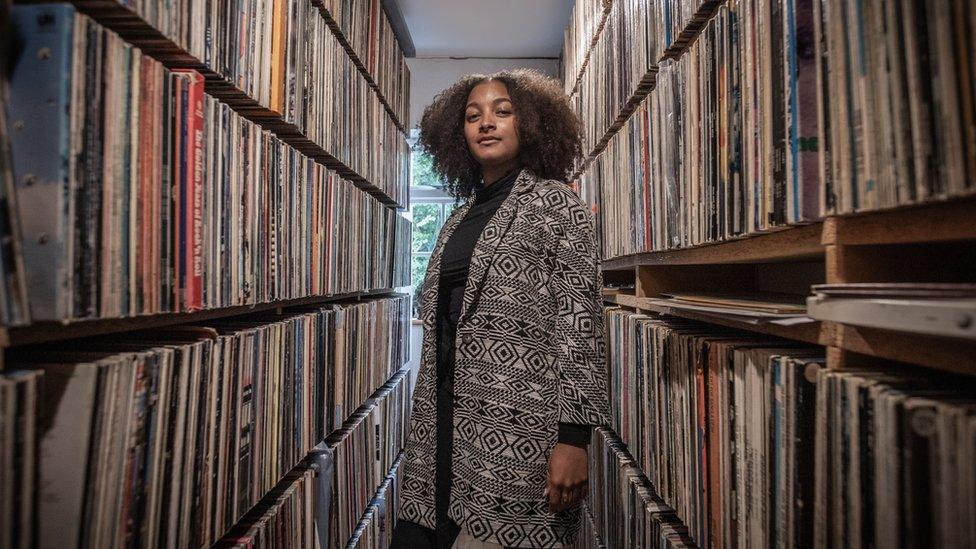
Jazz saxophonist Nubya Garcia was among the artists who travelled to Suffolk to dive into the collection
Spread across the house, the earliest LPs from the '60s are held in a long corridor of vinyl next to the DJ's studio, where he broadcast not only his Radio 1 shows, but hand-cut shows for British Forces in Germany using tape and a razor blade.
Because these records were placed in chronological order as Peel bought or was given them, a walk along the shelves sees the bright-eyed pop of his pirate radio days morph into British psychedelia and the glam and soul of the 70s.
In his study, were he worked at a standing desk with a typewriter, the album collection heads into the '90s and 2000s. These however don't include tens of thousands more 12 and seven inches stored elsewhere in the property.
Here, Peel filled in tens of thousands of filing cards representing each album. The alphabetised filing card offered a linked album number so the record could be found on the shelves.
For broadcast purposes, the DJ didn't trust the timings offered on the sleeve by the record company. Almost unbelievably, he stood with a stopwatch personally timing each track of the albums and typing up the result on to the filing card. This is a level of dedication Tom refers to as "basically a form of madness".
Each record also has Peel's "star system" of preferred plays, with three stars signifying it was probably played on air.
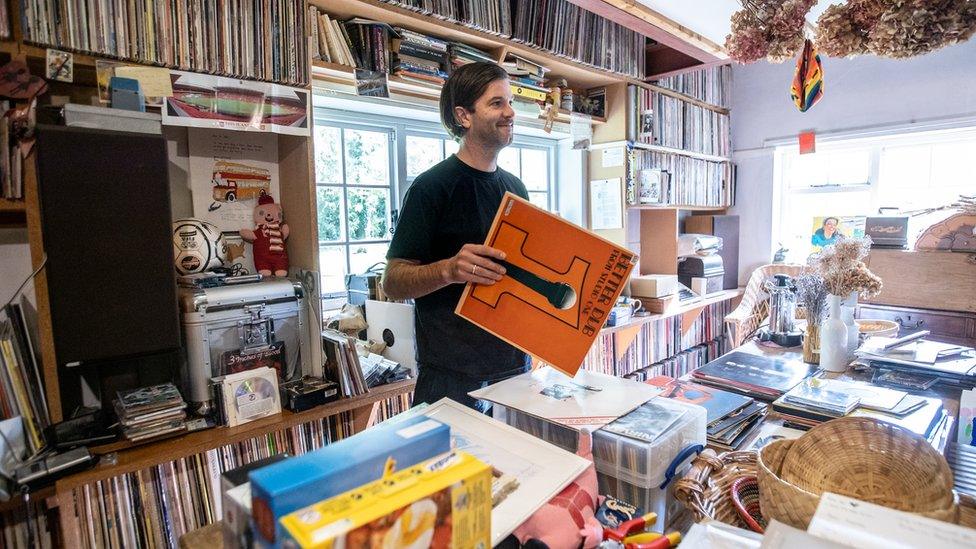
Tom Ravenscroft pictured in his late father's study
One of the podcast's guests, British jazz saxophonist Nubya Garcia, discovered the sheer depth of the collection, digging out not just a record she hadn't heard from free jazz legend Ornette Coleman, but finding a song she'd spent years searching for. Having heard it once on a tour bus, she couldn't remember the title of Al Campbell's Cherry Baby, but found the seven inch nestling in Peel's collection.
She said: "You're sidelined by how many records there are. I had to pretty much stop myself screaming every time I entered each room full of records. It's an incredible collection."
The unusual chronological layout and the anarchic press handouts in the sleeves attracted Damon Albarn as he made his selection.
Peering through the shelves, the former Blur singer found an original Kevin Ayers album Joy of a Toy he first listened to in his parents' collection, and also takes a punt on a record by '60s/'70s band The Idle Race.
Listening to the track, he discovers it's an early project from The ELO songwriter and producer Jeff Lynne.
Albarn said: "What this collection has is all the bits that have been edited out of people's legacies. It's interesting that they show how the artists perceived themselves, before all the reissues and the legends are set in stone."
For electronic musician Four Tet AKA Kieran Hebden the chance to get up close with a collection he heard about listening to Peel's show as a child was too good to miss.
He said: "People say 'you could see the Mona Lisa' but for me that's being asked 'would you like to see John Peel's record collection?' I knew instantly 'I have to see this'."
The visit paid off for the self-confessed "vinyl nerd", he broke off an interview to point out a record so rare he called it "obscene".
It was an original 1967 psychedelic seven-inch from session guitarist Caleb Quaye, Baby Your Phrasing is Bad, with valuations online estimated at £950.
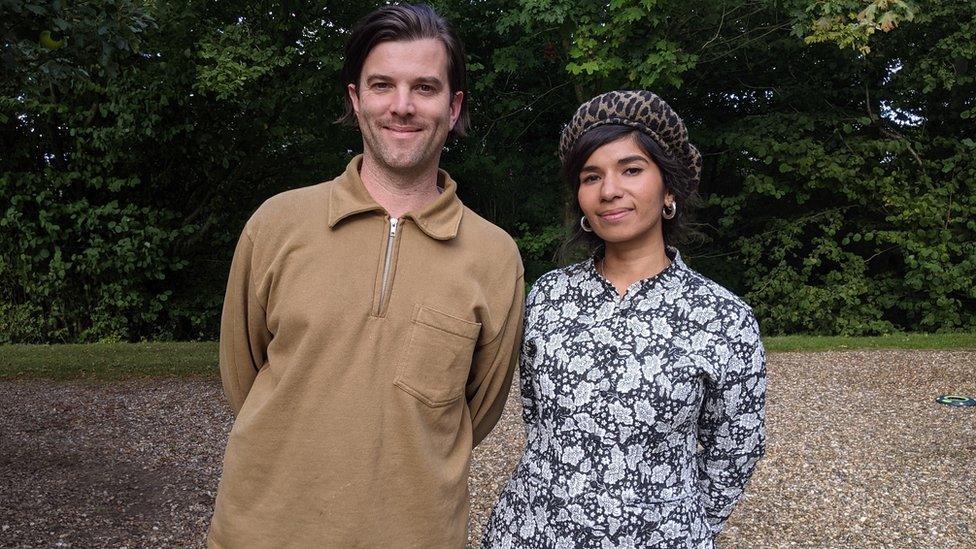
Hendrix fan Nabihah Iqbal was shown a very rare Jimi recording
But singles like that are worth a fraction of other finds - mint condition first editions of the first 13th Floor Elevators record, tiny runs of the early Nirvana cover Love Buzz and even a test pressing of The Sex Pistols' Anarchy in the UK.
Tom said: "We know this collection is a really important thing and we don't know entirely what to do with it. That brings a certain sadness.
"For me this was about bringing it alive again, but I'm one human being and it's 120,000 records so essentially I needed help."
Other exceptional rarities pulled from the collection include the Jimi Hendrix bootleg This Flyer.
Guitarist and singer Nabihah Iqbal discovered that the rare release, although not sanctioned by Hendrix, was sold to raise funds for The Black Panthers.
Tom added: "You basically get two kinds of people. People who stare at the amount of records and just don't know what to do, and people who completely ignore you and dive straight in.
"Hopefully we've gone for people who do the latter. All that we've asked people to do is go through the collection and pull out anything they like the look of.
"We just wanted to get records off shelves and onto decks."
Peel Acres airs on BBC Radio 6 Music on Sunday January 30 and is available on BBC Sounds.
Tom Ravenscroft presents his regular 6 Music show on Fridays, 9pm-12pm.
Related topics
- Published5 January 2021
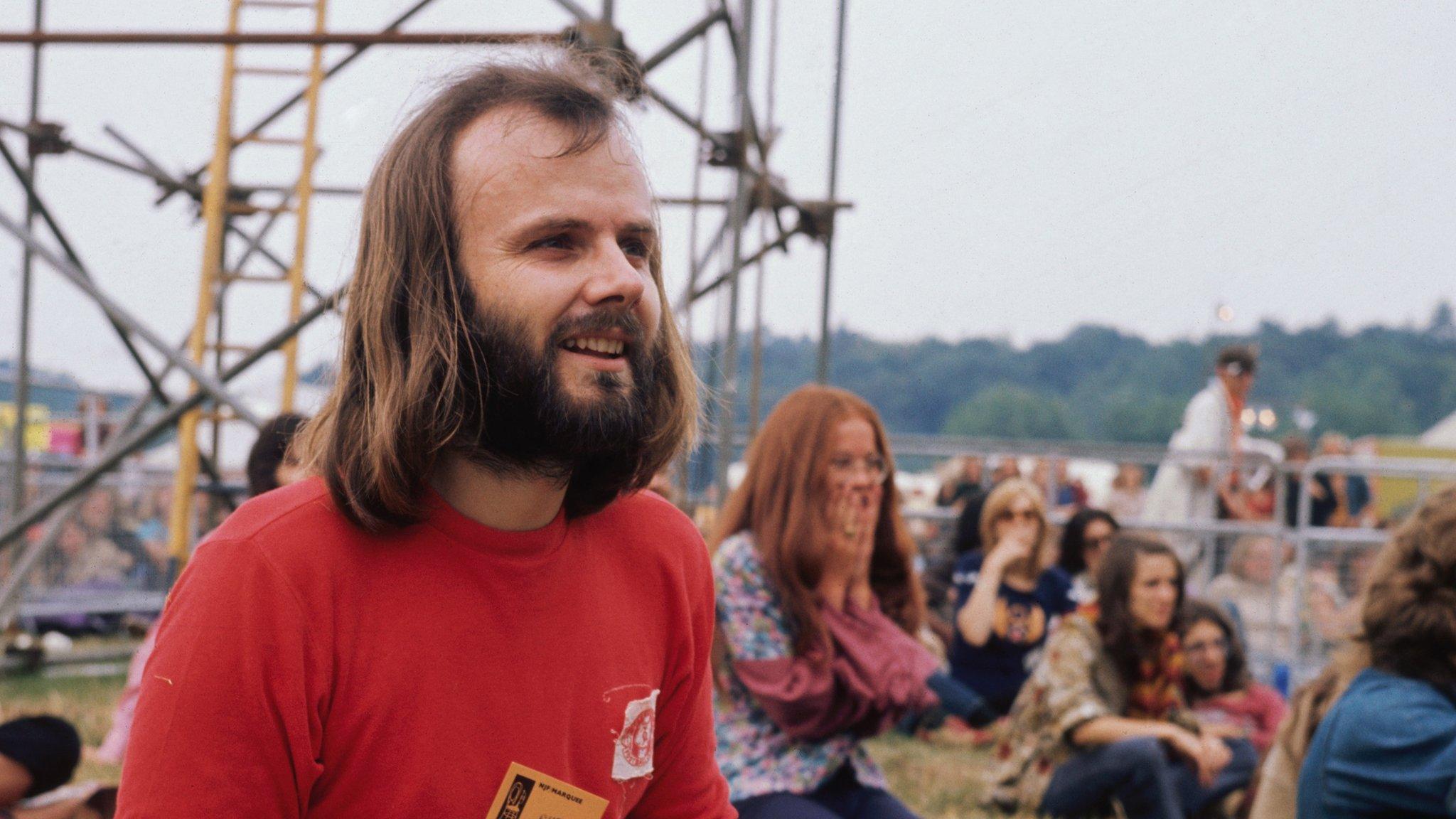
- Published2 October 2021
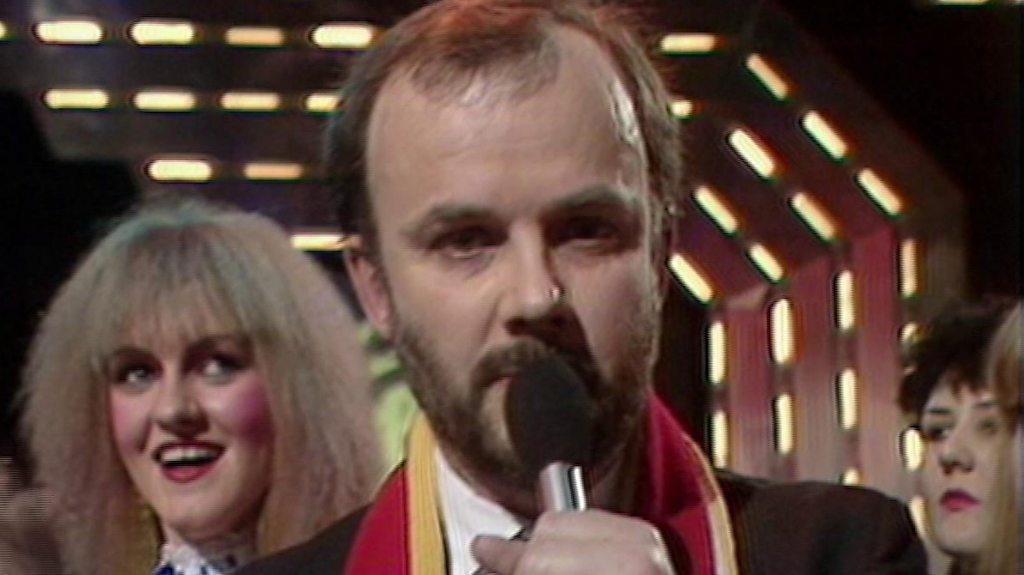
- Published7 August 2013
